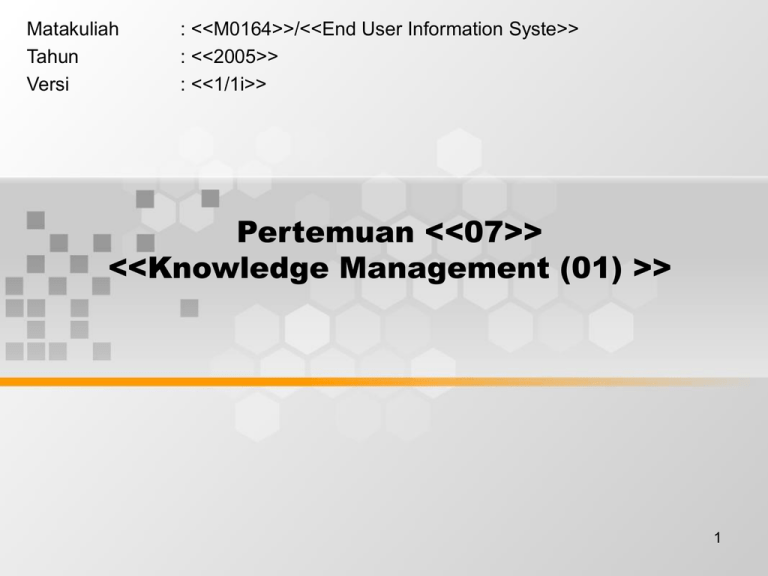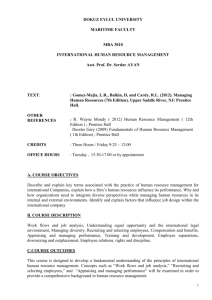Matakuliah : <<M0164>>/<<End User Information Syste>> Tahun : <<2005>>
advertisement

Matakuliah Tahun Versi : <<M0164>>/<<End User Information Syste>> : <<2005>> : <<1/1i>> Pertemuan <<07>> <<Knowledge Management (01) >> 1 Learning Outcomes Pada akhir pertemuan ini, diharapkan mahasiswa akan mampu : • Mahasiswa dapat menunjukkan pentingnya memanfaatkan knowledge management di perusahaan 2 Outline Materi • • • • Definisi KM Pentingnya KM dalam perusahaan teknologi untuk menyimpan, organisasi dan distribusi KM 3 Knowledge Management Back 5-4 Copyright Prentice Hall, 2002 Next End Learning Objectives • Define knowledge and knowledge management within a business context. • Explain the importance of knowledge management in contemporary enterprises. • Identify technologies that are most useful for capturing, organizing, distributing, and sharing knowledge within an enterprise. • Discuss the impact of intranets and groupware on knowledge management. Back 5-5 Copyright Prentice Hall, 2002 Next End Learning Objectives 2 • Explain how to formulate a knowledge management strategy. • Identify major requirements and issues for designing an enterprise knowledge architecture. • List and describe the steps for implementing knowledge management projects. • Identify common pitfalls for enterprises seeking to implement knowledge management and explain how to avoid them. Back 5-6 Copyright Prentice Hall, 2002 Next End Emerging Job Titles • • • • • • • • • • • • Chief Knowledge Officer (CKO) Director, Knowledge Networking Consultant, Corporate Quality Head of Knowledge and Differentiation Program (IBM U.K. Limited) Knowledge Management Initiative Leader (H-P Consulting) Chairman for Knowledge Sharing (Buckman Laboratories) Director, Collaboration and Knowledge Sharing (TI) Corporate Knowledge Strategist (NSA) Senior Technical Associate – Knowledge Management (Shell Chemicals) Project Director, Knowledge Management (World Bank) Vice President, Strategic Technology and Knowledge Management Information Technology Analyst Back 5-7 Copyright Prentice Hall, 2002 Next End Taxonomy of K-Careers • Knowledge and innovation professionals • Knowledge management professionals • Knowledge catalogers, researchers, and media specialists • Knowledge and competitive intelligence professionals • Knowledge and strategic integration professionals • Knowledge academicians, theorists, and visionaries • Knowledge facilitators, trainers, and corporate educators • Knowledge and expert systems professionals Back 5-8 Copyright Prentice Hall, 2002 Next End Objectives of Knowledge Management Number of companies with objective 6 Starting new business 7 Opening new markets Consumer relationship management 9 11 New product development Leverage “intellectual capital” 12 Process improvement 12 14 Customer/market information 15 Increasing employee capabilities 16 Transfer of best practices 0 5-9 1 2 3 Copyright Prentice Hall, 2002 4 5 6 7 8 9 10 11 Number of respondents = 19 12 13 14 15 Back 16 Next End What is Knowledge Management? Evolving Concepts and Directions •Best practice transfer •Information and records management •Organizational learning and innovation •Electronic performance support systems (EPSS) •Database management and data warehousing •Internet and e-business •The knowledge economy and knowledge as a corporate asset Back 5-10 Copyright Prentice Hall, 2002 Next End Major Trends in Knowledge Management •Rise of the corporate portal as the defining KM application •Recognition of knowledge economics as the context for the next-century business •Corporate initiatives target strategic KM •Organizational behavior focuses attention on human-resources aspects of KM More… •Microsoft also embraces KM Back 5-11 Copyright Prentice Hall, 2002 Next End Major Trends in Knowledge Management Theory gives way to emergence of practical KM •Customer successes show tangible results •Alignment of IT priorities and business strategy •IBM and Lotus led the convergence of business intelligence and knowledge management by coordinating their approaches to KM Back 5-12 Copyright Prentice Hall, 2002 Next End Knowledge Management in Action •Best Practices •Corporate Memory •Data Warehouses and Other Corporate Databases •Communities of Practice •Current Operations •Innovation and Generation of New Knowledge •Outside Information Back 5-13 Copyright Prentice Hall, 2002 Next End Enterprise Knowledge Management Environments 1. Attempts to create knowledge repositories 2. Attempts to create knowledge access 3. Attempts to improve knowledge environment and cultures Small-scale knowledge management projects Back 5-14 Copyright Prentice Hall, 2002 Next End << PENUTUP>> Selanjutnya Pert. 08 Knowledge Management 15



